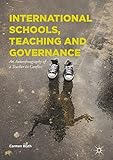International Schools, Teaching and Governance [electronic resource] : An Autoethnography of a Teacher in Conflict / by Carmen Blyth.
Material type: TextPublisher: Cham : Springer International Publishing : Imprint: Palgrave Macmillan, 2017Description: XXVII, 192 p. online resourceContent type: text Media type: computer Carrier type: online resourceISBN: 9783319467832Subject(s): Education | International education | Comparative education | School management and organization | School administration | Educational sociology | Teaching | Education and sociology | Sociology, Educational | Education | Teaching and Teacher Education | Early Childhood Education | Administration, Organization and Leadership | Sociology of Education | International and Comparative Education | Sociology of EducationAdditional physical formats: Printed edition:: No titleDDC classification: 370.711 LOC classification: LB1024.2-1050.75LB1705-2286Online resources: e-book Full-text access
TextPublisher: Cham : Springer International Publishing : Imprint: Palgrave Macmillan, 2017Description: XXVII, 192 p. online resourceContent type: text Media type: computer Carrier type: online resourceISBN: 9783319467832Subject(s): Education | International education | Comparative education | School management and organization | School administration | Educational sociology | Teaching | Education and sociology | Sociology, Educational | Education | Teaching and Teacher Education | Early Childhood Education | Administration, Organization and Leadership | Sociology of Education | International and Comparative Education | Sociology of EducationAdditional physical formats: Printed edition:: No titleDDC classification: 370.711 LOC classification: LB1024.2-1050.75LB1705-2286Online resources: e-book Full-text access | Item type | Current library | Collection | Call number | Copy number | Status | Notes | Date due | Barcode |
|---|---|---|---|---|---|---|---|---|
| E-Books | MEF eKitap Kütüphanesi | Springer Nature | LB1024.2 -1050.75 (Browse shelf (Opens below)) | Available | NATURE | 1419737-1001 |
PART I. The Journey/al and Reflections -- Chapter 1. The Story from Start to Finish -- Chapter 2. Re-Theorising and Re-Problematizing Conflict from A Posthumanist Stance: Meaning, Truth, and Understanding in a Posthumanist World -- PART II: Dimensions of Conflict -- Chapter 3. The International School: Taking Stock of a World 'Commodity'-Leadership and Management -- Chapter 3. The Apparatuses of Conflict -- Chapter 5. The Dark Side: Teacher Emotions and their Affect/Effect on Conflict -- Chapter 6. Concluding on a More Optimistic Note.
This book examines how injustice based on social positioning is performed within the context of international schools. Drawing on the lived experiences of an international school teacher, it proposes and explores the notion that teachers, in being constituted and positioned as subordinate within the hierarchy that is the international school, leads to their being wronged on three counts: epistemically for being wrongfully mistrusted; ethically for being wrongfully excluded; and ontologically for being wrongfully positioned as a lesser human being. The book addresses the dearth of research currently available on conflict in international schools and how conflict between teachers and administrators is dealt with in and by such institutions. It will be valuable reading for students and teachers of education and sociology, and those interested in the workings of international schools.
5
